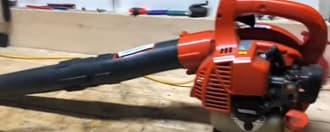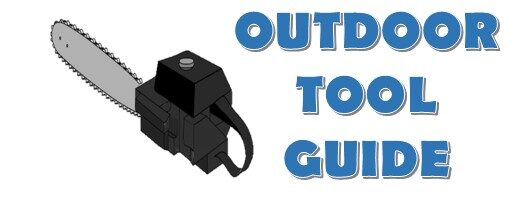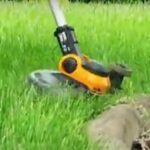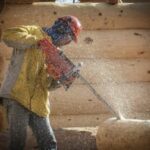As an Amazon Associate, this site earns commissions from qualifying purchases. For more information click here.
If you leaf blower gets wet, do not panic because a light drizzle is not going to cause serious damage. What will happen next depends on what type of leaf blower you use: gas, electric or battery. In this post we will walk you through step by step what you have to do depending on the machine you have.
Gas leaf blowers will be fine under occasional rain, but prolonged exposure can cause rust and make it difficult to operate. Electric and battery powered leaf blowers should never be used in wet conditions because water can short circuit electrical components and cause serious damage.
Is it Safe to Use Leaf Blowers in the Rain?
It depends on what type of leaf blower you have and how much rain you are experiencing. There are three basic types of leaf blowers: gas, electric and battery powered.
Gas leaf blowers: occasional light rain is not going to damage these power tools. A drenched air filter may not perform very well, but once dried it will be back to normal. Our choice is the Craftsman B215 25cc since it is built for heavy duty use
That said, you should not expose gas leaf blowers to constant rain and wet conditions. Leaf blowers are often not waterproof and could rust.
If it suddenly rains while you are using your leaf blower, there should be no issues. The problem is extended exposure to rain, moisture and humidity.
If you leave a gas leaf blower outdoors in a wet, humid environment for weeks, rust will set in. A rusty machine is difficult to use and may not even start at all.
Bottom line: If you have a gas leaf blower, never leave it outdoors after use. Store it in a dry, well ventilated place.
Electric and battery powered leaf blowers: do not use them in wet conditions. A wet environment can short circuit these tools. This can cause permanent damage and be dangerous.
Getting a leaf blower is not the same as flooding. That is a different matter and requires a different approach.
Some electric leaf blowers might be waterproof, but it is better not to risk it. Turn the leaf blower off when it rains and do not use it. Even if the model is labeled waterproof, it is never a good idea to use electrical equipment in the rain.
Battery powered leaf blowers are safer than electric. The risk of getting hurt is lower but water can damage the battery and make it inoperable.
How to Clean a Wet Leaf Blower
This video shows you how to clean and maintain a leaf blower. If you would rather read the instructions, follow the tips below. You can use this guide for the Poulan Pro PR48BT and other types of leaf blowers.
If your gas leaf blower got wet, just wipe it with a cloth. When the machine dries and the weather clears you can use it again.
However if you are using an electric or battery machine, do these instead.
Step 1
Turn the machine off and unplug / disconnect from the power source. Check the battery compartment and dry the batteries if necessary.
Step 2
Tilt the leaf blower to remove water stuck inside. Try remove as much of the water as possible.
Step 3
Use a dry, clean cloth to dry the outside of your leaf blower.
Step 4
If you have the knowledge you can take apart the case. This speeds up the drying process but you should only do this if you know how.
Now you have two choices: air dry or use a blow dryer on the vents. Blow drying is faster but can be risky. Air dryer is safer but can require several days depending on the weather.
This is also why it is important you remove as much water as possible. If you blow dry the vent and there is still water inside, it will clog the leaf blower even more.
This is also why it is important you remove as much water as possible. If you blow dry the vent and there is still water inside, it will clog the leaf blower even more.
Once the machine is dry, reconnect it to its power source and turn it on. If it does not run, shut it off and examine for signs of damage.
Is it Safe to Leaf Blower Wet Leaves?
Leaf blowers are often used in the fall and it is ideal for cleaning leaves before the weather gets cooler. But what would happen if you used a leaf blower on wet leaves?
Leaf blowers can handle damp leaves, but if they are soaked it will require a lot of power. For drenched leaves it is better to let them dry before using a leaf blower, or you can just use a rake.
The biggest problem with wet leaves is the weight because leaves get heavier when soaked. The wetter it is, the heavier and the harder your leaf blower has to work. If you are unsure, examine the leaves.
If the leaves are only damp you can use a leaf blower. Light moisture is not going to adversely affect the machine.
If the leaves are wet, you can still use a leaf blower. It will take more effort but if you have a powerful model it will still work.
Drenched or leaves soaking in water have to be dried first. The extra weight from the water is going to put a lot of pressure on the blower. It might be able to do the job but this could also shorten its lifespan.
If you want to blow wet leaves you will need a powerful leaf blower. Make sure the model you buy has the specs that can handle heavy duty work. Wet leaves will also need a larger bag or container so you have to keep that in mind.

What to Look For in Leaf Blowers for Wet Leaves
While majority of leaf blowers are meant for use with dry leaves, you can put it to work on wet leaves under certain conditions. To be successful, your leaf blower must have particular features or specifications.
The best leaf blowers for wet leaves are those with a tight air passage and superior air stream. Quality construction is a must as well.
The bag used for collecting leaves has to be large and waterproof. Since the leaves are wet, the bag has to be waterproof and not leak.
The nozzles must be durable and built for heavy duty use. The wetter the leaves, the more work your leaf blower has to do. This is where powerful nozzles come into play.
Between gas, electric and battery, a gas powered leaf blower is the best option. For one thing, it is safer to use in wet or rainy conditions compared to electric and battery models. Second, gas blowers are more powerful.
If water mixes with the gas, the worst thing that can happen is the machine does not start. You can however, take it to a repair shop or buy a new one. If water short circuits an electrical leaf blower, there is a strong possibility you could get hurt.
Frequently Asked Questions
What happens if you leave a leaf blower in the rain?
Nothing good, but the extent of the damage depends on the leaf blower. If it is gas, not much. If the water seeps into the gas the machine probably will not start. But you just need to dry it, put new gas in and it will work again.
Electric leaf blowers will get damaged if left in the rain. In a heavy downpour, the water will make its way into the chassis and cause a short circuit. A battery run blower is also sensitive to heavy rain.
Are leaf blowers waterproof?
No, most of them are not. That is why you should avoid using them in the rain. It is all right to use them on damp leaves. But running it in a heavy downpour is inviting trouble.
Why is my leaf blower no longer working on wet leaves?
Most leaf blowers are meant for use with dry leaves. The powerful ones can handle damp leaves on occasion. But if you use it all the time the components will quickly wear out. Compare the weight of dried leaves with those soaking wet and you will get an idea of what the machine has to deal with.
If you are going to use the leaf blower on wet leaves, it will wear out faster. That is why it is important that you get a powerful machine that can handle the heavy load.

I love the outdoors and all the tools for maintaining gardens, yards and lawns. The only thing I am more passionate about is sharing what I know about garden and outdoor equipment.


